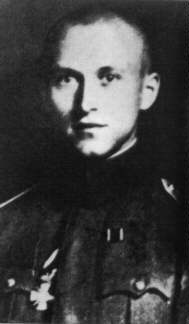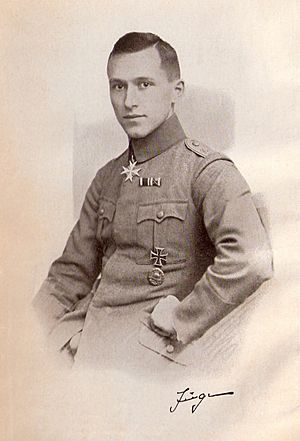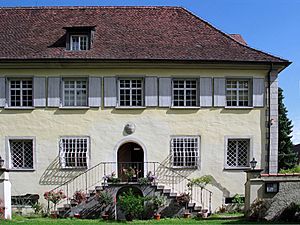Ernst Jünger facts for kids
Quick facts for kids
Ernst Jünger
|
|
|---|---|
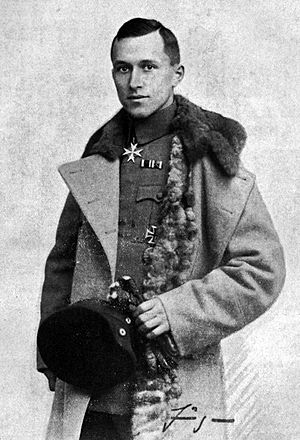
Jünger in 1920.
|
|
| Born | 29 March 1895 Heidelberg, Grand Duchy of Baden, German Empire |
| Died | 17 February 1998 (aged 102) Riedlingen, Germany |
| Genre | Diaries, novels |
| Subject | War |
| Notable works | In Stahlgewittern Auf den Marmorklippen |
| Notable awards | Iron Cross I. Class (1916) Pour le Mérite (1918) Grand Merit Cross (1959) Schiller Memorial Prize (1974) Goethe Prize (1982) Maximilian Order (1986) |
| Spouse |
Gretha von Jeinsen
(m. 1925; died 1960)Liselotte Lohrer
(m. 1962) |
| Military career | |
| Allegiance | |
| Service/ |
French Foreign Legion Prussian Army Reichsheer German Army |
| Years of service | 1913, 1914–1923, 1939–1944 |
| Battles/wars | World War I World War II |
Ernst Jünger (born March 29, 1895 – died February 17, 1998) was a German writer, a brave soldier, and someone who studied insects (an entomologist). He became famous for his book Storm of Steel, which was about his experiences in World War I.
Jünger grew up in a wealthy family, but he wanted adventure. He joined a German youth movement called Wandervogel. Later, he even ran away to join the French Foreign Legion for a short time. This was against the law in Germany.
Thanks to his father's help, Jünger avoided trouble and joined the German Army when World War I started in 1914. He was wounded many times during the war. In 1918, he received the Pour le Mérite, which was a very rare and high award for a soldier of his rank.
After World War I, Jünger wrote about his dislike for liberal ideas and democracy. He also didn't like the Weimar Republic, which was the German government at the time. However, he refused to join the Nazis as they became powerful. During World War II, Jünger served as an army captain in Paris, which was occupied by Germany. By 1943, he strongly disagreed with the Nazis' goals of taking over the world. He even wrote a work called "Der Friede" (The Peace) about this change.
Jünger was removed from the army in 1944. This happened because he was indirectly linked to other officers who had planned to kill Hitler. A few months later, his son died in battle in Italy. After the war, some people were suspicious of Jünger, thinking he might have supported the Nazis.
However, as time went on, his writings were seen as more about conservative ideas than extreme nationalism. His philosophical works became highly respected in Germany. Jünger lived to be an honored writer. Still, some critics said his early works made war seem too glorious. He was a strong believer in militarism and a very complex person in 20th-century German literature.
Contents
A Look at Ernst Jünger's Life
Early Years and Adventures
Ernst Jünger was born in Heidelberg in 1895. He was the oldest of six children. His father was a chemical engineer who became quite wealthy. Ernst went to school in different places, including Hannover and Wunstorf.
During his school years, he developed a great love for adventure novels and for studying insects (entomology). In 1909, he spent some time as an exchange student in France. In 1911, he and his younger brother, Friedrich Georg Jünger, joined the Wandervogel movement. This was a youth group that loved nature and hiking. Ernst also started writing poetry around this time.
In 1913, Jünger was a student in Hamelin. He then traveled to Verdun and joined the French Foreign Legion. He wanted to go to North Africa. He was sent to a training camp in Algeria. But he ran away to Morocco. He was caught and brought back. Six weeks later, he was let go from the Legion. This happened because the German government stepped in to help him. His father told him it cost a lot of money to get him out of trouble. After this, Jünger was sent to a boarding school in Hanover.
World War I Experiences
On August 1, 1914, soon after World War I began, Jünger joined the German Army as a one-year volunteer. After training, he was sent to the front lines in December. He was wounded for the first time in April 1915. While recovering, he became an officer trainee.
Jünger became a Second Lieutenant in November 1915. As a platoon leader, he became known for his bravery and for taking initiative in battles. During the Battle of the Somme, he was wounded by shrapnel and sent to the hospital. He was wounded again in November 1916. In January 1917, he received the Iron Cross First Class.
In the spring of 1917, he was promoted to Captain. He commanded the 7th company. He was involved in intense fighting, even forcing some retreating soldiers to join his defense line. He also helped his wounded brother, Friedrich Georg, get to safety. In the Battle of Cambrai (1917), Jünger was wounded twice more. He was hit in the head by a bullet and a shell fragment.
He received the House Order of Hohenzollern for his actions. In March 1918, during a major German attack, half of his company was lost to an artillery hit. Jünger survived and led the remaining soldiers forward. He was wounded two more times during this action. After recovering, he returned to his regiment in June. He felt that Germany was losing the war.
On August 25, he was wounded for the seventh and final time. He was shot through the lung while leading his company. He managed to escape to a machine-gun post. A doctor there told him to lie down. He was carried to the back lines, but the doctor was killed. Another soldier managed to carry Jünger to safety.
Jünger received the Wound Badge 1st Class. While he was in a hospital in Hannover, he learned he would receive the Pour le Mérite. This was the highest military award in the German Empire. It was usually given to high-ranking officers. Jünger was one of only eleven infantry company leaders to receive it.
Throughout the war, Jünger kept a diary. This diary became the basis for his famous 1920 book, Storm of Steel. In his free time, he read books by famous thinkers like Nietzsche. He also collected beetles in the trenches and while on patrol. He collected 149 specimens, which he listed in a special insect record book.
Between the World Wars
Jünger continued to serve in the army of the Weimar Republic until 1923. He studied marine biology, zoology, botany, and philosophy. He also became a well-known entomologist (insect expert). There is even an important insect prize named after him in Germany.
His book Storm of Steel (German title: In Stahlgewittern), which he published himself in 1920, slowly made him famous. In 1925, he married Gretha von Jeinsen. They had two sons, Ernst Jr. and Alexander.
Jünger was critical of the Weimar Republic's democracy. He said he "hated democracy like the plague." In his writings, he often described war as a powerful experience that showed the true nature of life. In 1932, he published The Worker (German title: Der Arbeiter). This book suggested a society run by strong, active people who were like warrior-worker-scholars. In his 1934 essay On Pain, Jünger wrote that he did not value comfort or safety. Instead, he believed that a person's strength came from their ability to handle pain and make sacrifices.
During the Third Reich
Jünger was a famous war hero and a nationalist writer who criticized the Weimar Republic. Because of this, the rising Nazi Party (NSDAP) tried to get him to join them. However, Jünger refused their offers. When he moved to Berlin in 1927, he turned down a chance to be a member of the German Parliament (the Reichstag) for the Nazi Party. In 1930, he openly spoke out against Hitler's actions.
In 1932, the official Nazi newspaper attacked Jünger for not agreeing with their ideas. Jünger again refused a seat in the Reichstag after the Nazis took power in 1933. He also refused to lead the German Academy of Literature.
In 1934, Jünger wrote a letter to the Nazi newspaper, asking them not to publish any of his writings. He also refused to speak on Joseph Goebbels's radio. Jünger was one of the few nationalist writers who never publicly declared loyalty to Hitler. He and his brother left a veterans' organization when its Jewish members were forced out.
When Jünger left Berlin in 1933, his house was searched many times by the Gestapo, the Nazi secret police. In 1939, he published On the Marble Cliffs. This short novel used metaphors to show Jünger's negative feelings about Hitler's Germany.
He served as an army captain in World War II. In 1939, he rescued a wounded soldier and received the Iron Cross Second Class again. He was assigned to an office job in occupied Paris. There, he met famous artists like Picasso and Jean Cocteau. He also shared information that helped save Jewish lives.
His early time in France is described in his diary Gärten und Strassen (1942, Gardens and Streets). Jünger was also given the job of overseeing the execution of a German soldier who had deserted. He wrote in his journal that he attended "in the spirit of higher curiosity."
Jünger was somewhat involved with the July 20 Plot, a plan to bomb Hitler. He inspired some anti-Nazi officers in the German Army. In Paris, he was close to the officers who tried to kill Hitler. In June 1944, Jünger visited Erwin Rommel's headquarters. There, he discussed his 30-page peace plan, "Der Friede" (The Peace). This plan was meant to be given to the Allies after Hitler was removed from power. It also suggested a united Europe.
Jünger was only slightly involved in the plot. After it failed, he was dismissed from the army in August 1944. He was not executed, partly because of the chaos at the end of the war. He was also very careful, burning sensitive writings from 1933 onwards. Some say Hitler himself said, "Nothing happens to Jünger."
His older son, Ernst Jr., was an 18-year-old naval cadet. He was imprisoned that year for having "subversive discussions." This was a serious offense. He was sent to a special military unit. He was killed in Italy in November 1944. Jünger was never sure if his son was killed by the enemy or by the SS.
After the War
After World War II, Jünger was at first viewed with some suspicion because of his nationalist past. The British forces occupying Germany banned him from publishing for four years. This was because he refused to go through the process of denazification, which was meant to remove Nazi influence.
His book The Peace (German title: Der Friede), written in 1943 and published in 1948, showed that he was no longer involved in politics. By the 1950s, his public image improved. He became known as a very important figure in West German literature.
A German publisher released a ten-volume collection of his works in 1965. This collection was later expanded to 18 volumes. This made Jünger one of only four German authors to have two editions of their collected works published during their lifetime. The others were Goethe, Klopstock, and Wieland.
His diaries from 1939 to 1949 were published as Strahlungen (1948, Reflections). In the 1950s and 1960s, Jünger traveled a lot. His first wife, Gretha, died in 1960. In 1962, he married Liselotte Lohrer. He kept writing a lot throughout his life, publishing more than 50 books.
The philosopher Martin Heidegger was greatly influenced by Jünger's book The Worker. Jünger was also one of the first writers to use magical realism. His book The Glass Bees (1957, German title: Gläserne Bienen) describes a future where machines threaten people's individuality. This book can be seen as a science fiction story. Jünger was a sensitive poet who also studied plants and animals. His books often include many details about the natural world.
Later Life and Legacy
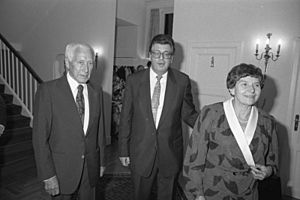
In his later writings, Jünger developed the idea of the Anarch. This is an ideal person who is a truly independent individual. He wrote about this in his 1977 novel Eumeswil.
In 1981, Jünger received the Prix mondial Cino Del Duca, a major literary prize. He was very popular in France. In 1984, he spoke at the Verdun memorial, alongside French President François Mitterrand and the German Chancellor. He said that the "ideology of war" in Germany before and after World War I was a "terrible mistake."
Even though he was cleared of supporting the Nazis in the 1950s, Jünger remained a controversial figure. This was because of his conservative political views and his role as a conservative thinker. Despite the criticism, Jünger said he never regretted anything he wrote.
Jünger's 100th birthday on March 29, 1995, was celebrated by many, including the French President.
Death
Jünger grew up in a family that did not believe in God. However, shortly before he died, he became a Roman Catholic. He received the Sacraments of the Catholic Church a year before his death.
Ernst Jünger died on February 17, 1998, in Riedlingen, Germany, at the age of 102. He was the last living person to have received the military version of the order of the Pour le Mérite. He was buried at Wilflingen Cemetery. Jünger's last home in Wilflingen is now a museum called Jünger-Haus Wilflingen.
Ernst Jünger's Photography
Ernst Jünger also published several photo books. These books went along with his writings about technology and modern life. The seven photo books he published between 1928 and 1934 show his more militaristic and nationalist views from that time.
His first photo books, Die Unvergessenen (The Unforgotten, 1929) and Der Kampf um das Reich (The Battle for the Reich, 1929), were collections of photos of fallen World War I soldiers and the war front. Many of these photos he took himself. He also wrote essays about war and photography in a photo book called Das Antlitz des Weltkrieges (The Face of the World War, 1930). He edited other photo collections about World War I as well. Jünger also wrote the foreword for a photo book about airplanes and flying.
Awards and Honors
Ernst Jünger received many awards and honors throughout his long life. Here are some of them:
- 1916 Iron Cross (1914) II. and I. Class
- 1917 Prussian House Order of Hohenzollern Knight's Cross with Swords
- 1918 Wound Badge (1918) in Gold
- 1918 Pour le Mérite (military class)
- 1934 The Honour Cross of the World War 1914/1918
- 1939 Clasp to the Iron Cross Second Class
- 1956 Bremen Literature Prize; Culture Prize of the city of Goslar
- 1959 Grand Merit Cross
- 1960 Honorary Citizen of Wilflingen; honorary gift from the Cultural Committee of German Industry
- 1965 Honorary Citizen of Rehburg; Immermann Prize of Düsseldorf
- 1970 Freiherr- vom-Stein- Gold Medal
- 1973 Literature Prize of the Academy Amriswil
- 1974 Schiller Memorial Prize of Baden-Württemberg
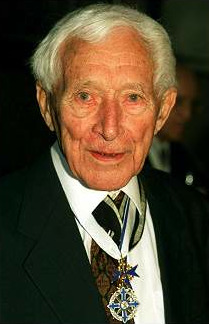
- 1977 Aigle d'Or from Nice; Great Federal Cross of Merit with Star
- 1979 Médaille de la Paix (Peace Medal) of Verdun
- 1980 Medal of Merit of the State of Baden-Württemberg
- 1981 Prix Europa Littérature; Prix Mondial Cino del Duca (Paris); Gold Medal of the Humboldt Society
- 1982 Goethe Prize of Frankfurt
- 1983 Honorary Citizen of Montpellier; Premio Circeo
- 1985 Grand Cross of the Order of Merit of the Federal Republic of Germany
- 1986 Bavarian Maximilian Order for Science and Art
- 1987 Premio di Tevere (awarded by Francesco Cossiga in Rome)
- 1989 Honorary doctorate from the University of the Basque Country in Bilbao
- 1990 Oberschwäbischer Art Prize
- 1993 Grand Prize of the Jury of the Venice Biennale
- 1993 Robert Schuman Prize, Alfred Toepfer Foundation
- 1995 Honorary doctorate from the Complutense University of Madrid
In 1985, for Jünger's 90th birthday, the German state of Baden-Württemberg created the Ernst Jünger Prize in Entomology. This prize is given every three years for excellent work in the study of insects.
Ernst Jünger was the last living person to have received the military 'Pour le Mérite' award.
Films About Ernst Jünger
- La Guerre d'un seul homme (One Man's War) (1981): This film mixes parts of Jünger's World War II diaries from his time in Paris with French propaganda films from the same period.
- 102 Years in the Heart of Europe: A Portrait of Ernst Jünger (1998): A Swedish documentary film about Jünger.
See also
 In Spanish: Ernst Jünger para niños
In Spanish: Ernst Jünger para niños


